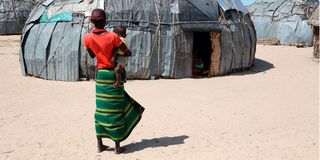Why child marriage will last until 2092: UN's shocking forecast

A young mother carrying her baby at Watali Manyatta in Illeret Village,Marsabit County on April 19, 2024. A UN report reveals that child marriage in Kenya won't end until 2092.
What you need to know:
- A UN report reveals that child marriage in Kenya won't end until 2092, with rural areas showing higher rates than urban areas.
- The practice thrives during natural disasters, as illustrated by Lokedo's story of being married off before puberty during floods that cut off her Turkana village.
- While the government has laws against child marriage and organisations are training local champions to fight the practice, poverty and cultural values that prize livestock over girls continue to fuel the crisis.
"I cried until I was too weak to cry anymore." These words from Lokedo*, a child bride from Turkana, echo the silent screams of thousands of girls whose childhood ends at the altar.
As Kenya grapples with ending child marriage, a shocking United Nations (UN) report delivers a devastating verdict: at the current rate, the practice will persist until 2092.
According to this year's UN report on the progress towards the realisation of the UN Sustainable Development Goals, today's new-borns will be grandparents before child marriage is finally eradicated. The statistics paint a stark urban-rural divide: Kenya's Beijing +30 country report shows child marriages in urban areas at 15 percent, while rural areas record a higher 20 percent.
The government recognises that child marriage is driven by poverty, lack of education, the low social and economic value placed on girls, and the influence of religious and cultural norms and practices.
It is further exacerbated by natural disasters, conflicts and epidemics. The government states that it is working towards ending child marriage through laws such as the Children Act (2022), which prohibits marrying a child, and the Marriage Act (2014), which permits marriage only for those aged 18 and above.
But the reality on the ground tells a different story. Poverty, lack of education, absence of proper infrastructure, natural disasters, and the low social and economic value placed on girls all conspire to advance the practice of marrying off underage girls.
This was clear in a November 8, 2023, interview by phone, through a translator, with a young woman who had been married off as a child during a rainy season.
Lokedo* was married off in her village, Nanam, in Turkana West, Turkana County.
At the time, the village was cut off, with impassable roads due to flooding and seasonal rivers overflowing with raging waters.
"My mother woke me up in the morning. She told me it's my wedding day. The bridegroom had already arrived," Lokedo said.
Lokedo had never been to school and did not speak or understand Kiswahili. She also had no recollection of when she was married or how old she was.
All she remembered was that her breasts had not yet developed.
"I wanted to run away to somewhere very far, but how could I do that (with the floods everywhere)?" she said.
"I cried until I was too weak to cry anymore. So, I just accepted my fate."
Lokedo says her "husband" was youthful but died before she delivered her first-born daughter, whom she believed was five years old. She was later inherited and now has two more daughters.
At the time, a rights organisation had partnered with the government to empower locals economically and discourage them from marrying off their daughters.
"We have trained 280 of them in Turkana West Sub-County, and each of them is expected to reach out to 20 others. And each of the 20 is to do the same," Walter Mounde, gender and social inclusion officer at Adventist Development and Relief Agency-Kenya (ADRA Kenya), told Gender Desk.
He said they trained girls and young women aged 15-24, some of whom were forced into marriage before they reached 18 years. The trained became the village champions speaking against the harmful cultural practice.
Mounde said those with lived experiences share their pains and tribulations with community members to make them understand why it is urgent to stop finding suitors for their children against their will.
"We don't just equip them with information on ending child marriage. We realise that financial freedom is also key. And so we have helped them start village savings and loans associations so they can start businesses to build their resilience and send their children to school," he said.
Beatrice Kotola, a probation officer attached to Kakuma Law Courts and part of the partnership, was, however, concerned that the village champions would be compromised or threatened, considering they come from the locality.
"The village champions need the government's support. They need hotlines for calling to report such cases," she said.
She said the flooding made it possible for many parents to marry off their girls.
"Many weddings have taken place, and many more will with the ongoing rains," she told Gender Desk on November 9, 2023.
"There is now grass, and the cows are getting fat. The parents are looking at their girls, and all they see is dowry. Here, livestock is more important than a girl. A girl can go missing for a whole month, and nobody will look for her. But if an animal does, everyone will be running around the bush looking for it."





